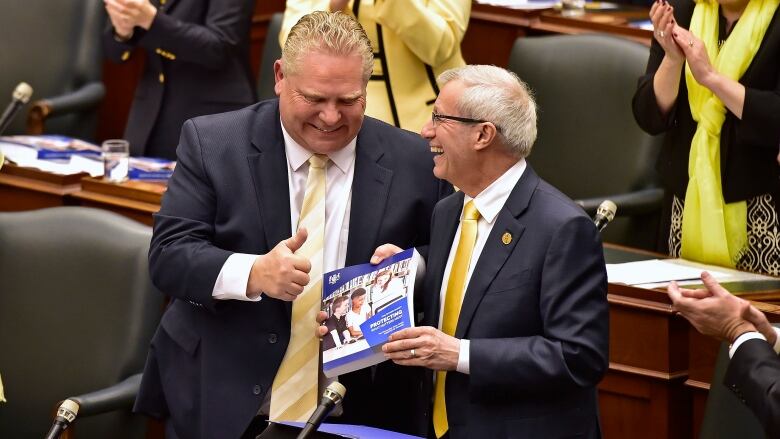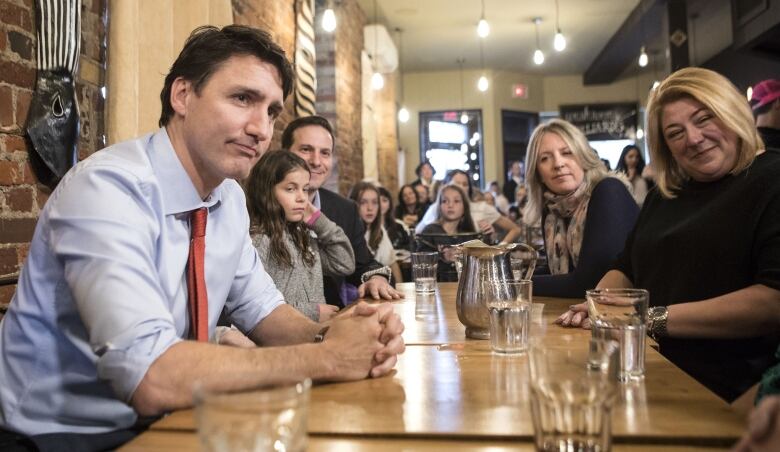Doug Ford's PCs conclude that voters don't want deficit-slashing above all else
What really matters is whether Ontarians see cuts in key services and feel the effects of austerity

Ontario Premier Doug Ford and his Progressive Conservatives have done their political math and reached some conclusions about the voters who gave them a majority government.
The PCs have realizedOntariansdon't want them to slash the deficit at all costs.
- Ontario Budget 2019: Child-care rebate, seniors dental care, drinking in parks
- Booze, gambling, combat sports all figure in Ford government budget
Still, there's no doubt the budget tabled Thursday by Finance Minister Vic Fedeli will bring some significant pain to various parts of the public sector along the budget'sfive-year path back tobalance.
The budget sketches out a plan to significantly ratchet back the growth in spending in the two biggest ministries, health and education.
- Healthspending would increase by an annual average of just 1.6 per cent until 2021-22. In the previous three years, health spending rose an average of 4.2 per centa year.
- Education spending would increase by an annual average of just 1.2per cent until 2021-22. In the previous three years, it rose 3.8 per centa year, on average.

The PCs are freezing or cutting spending in just about every other ministry. Across government, total program spending would go upan average of 0.8 per cent annually in the next three years.Factor in inflation and population growth, and that means real per capita spending will becut.
Those are the top-line numbers, giving an overall message that says "austerity." What will really matterboth politically for Ford and practically for people is whether Ontarians feel the effects of that austerity. Will it bring perceptible cuts to public services?
- TrudeauLiberals try to use Ford budget against Scheer'sConservatives
- PC budget aims to cut $200 million from public health units
The fact that we don't yet know the answer to that question is one of the clever political moves in Fedeli'sbudget. It's hard for anyone to figure out by reading the entire 343-page budget exactly what specific services will becut. When someone says, "The growth in health care spending is slowing," there is no big public outcry.If someone can say,"Thishospital is going to close!" the outcry begins.
We do know that legal aid funding is dropping, primarily hurting refugee claimants (who don't vote).Colleges and universities will lose some funding if they don't meet unspecified "performance indicators," eventually. The budget says the government"has already reduced the size of the Ontario Public Service by 3.5 per cent through voluntary attrition alone."
There will be an impact, but that impact won't be immediately apparent.

This matters for federal politics, in this election year.The cuts won't likely be felt quickly enough to help JustinTrudeauand his Liberals.They were hoping the Ford budget would be a wrecking ball, so this fall they could use it to warn voters in Ontario and across the country: "See what happens when you elect Conservatives?" They tried this tactic on Friday.
Before budget day, pollsters told me that most Ontarians, includingmany who voted for Ford, don't actually care much about the deficit right now. Their polling suggests thatpeoplewant key public services preserved far more than they want a "cut-the-deficit-above-all-else" approach.
- PCs say scrappingboard will speedup payments to crime victims
- Ford government threatens gas stations with $10,000/day fines if they don't display carbon-tax stickers
Ford's political advisers have seen this polling, too. They tell me that PC supporters want to see the government on track to a balanced budget, but don't mind whether it happens before the next election or after. They want to see bureaucratic waste eliminated, but don't want schools closed or patients on stretchers in hospital hallways.
Yet a huge question remains: Is there any way the PCs can meettheir targets for restraining spendingwithout affecting public services?
With Ontario's hospitals getting less than half the increase they told the government they needed, and with the population growing and aging, it's hard to see how the health system will be able to keep up with the demands on it.

The budget projects saving more than $1 billion annually in health by 2021-22, "with no impact onpatient care." The PCs say they can achieve this by saving:
- $350 million by creating the Ontario Health super-agency
- $250 millionby "optimizing health-care workforce productivity," such as reducing overtime and improving scheduling
- $200 million by cutting the number ofpublic health units
- $140 million by changing how the government pays pharmacy fees
- $100 million by reducing administration costs
Let's check back in a couple of years to see if they actually managed to do this.
The budget indicates that growing enrolment will eat up the bulk of the forecast 1.2 per cent annual spending increase in education.That means the PCs are banking on getting all the teachers' unions in Ontario (whose contracts all expire this summer) to accept wage freezes, or have them imposed. Don't expect that to happen without a peep.
The budget is finally disproving Ford's repeated promises on the campaign trail that "no one will lose their job" under his government.It emerged Friday that 52 people lost their jobs in the closure of the offices of the children's advocate and French-language watchdog. It's hard to see how the PCs' austerity plan won't ultimately bring more public-sector job losses.












_(720p).jpg)


 OFFICIAL HD MUSIC VIDEO.jpg)
.jpg)



























































































